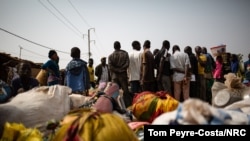Of the world’s 10 most neglected displacement crises, nine are in Africa, the Norwegian Refugee Council reports in an annual assessment released Wednesday.
“The deep crises represented by millions of displaced Africans are yet again the most underfunded, ignored and deprioritized in the world,” Jan Egeland, the NRC’s secretary general, said in a news release announcing its new report. “They are plagued by diplomatic and political paralysis, weak aid operations and little media attention. Despite facing a tornado of emergencies, their SOS calls for help fall on deaf ears.”
Cameroon tops the list of neglected crises for the second consecutive year. The West African nation has reeled from conflict over the Anglophone separatist movement in Cameroon’s English-speaking northwest and southwest regions, displacing more than 679,000 people.
It’s followed by the Democratic Republic of the Congo, Burkina Faso, Burundi, Venezuela, Mali, South Sudan, Nigeria, Central African Republic and Niger.
The countries from Africa’s Sahel region – Burkina Faso, Mali, Nigeria and Niger – all have been beset by extremist violence and receive insufficient aid, the NRC said.
Venezuela is the only non-African entry on the list. The once-wealthy South American country has been devastated by falling oil prices and political strife. The socialist government led by Nicolas Maduro also blames economic sanctions by the United States and its allies for its misfortunes.
The NRC said it expects the novel coronavirus pandemic will worsen conditions for the countries on its list – and for others, too.
“The World Food Program is cutting rations at a time when you have an economic struggle caused by COVID,” Pål Nesse, an NRC senior adviser, said by phone from Oslo on Tuesday. Trade and distribution problems have contributed to higher prices than normal, he said, emphasizing that if humanitarian aid is reduced, “the situation becomes more urgent. … More people will starve.”
The World Food Program predicts that 265 million people globally will confront acute food insecurity this year because of the pandemic, more than doubling the number who experienced food shortages in 2019.
The NRC reviewed more than 40 crises in which more than 200,000 people have been displaced. It compiles its list based on three criteria that are lacking: political will, media attention and international aid.
The organization defines political will as the degree to which armed parties on the ground will protect civilians’ rights and “engage in peace negotiations, and international actors' willingness or ability to find political solutions.”
To assess media attention, it used the media monitoring firm Meltwater. It gauges international aid deficits based on U.N. and humanitarian partners’ funding requests and the extent to which these are met.
The previous year’s list, in descending order of severity, included Cameroon, the DRC, Central African Republic, Burundi, Ukraine, Venezuela, Mali, Libya, Ethiopia and Palestine.
Nesse suggested countries such as Ukraine and Libya commanded more attention last year with the migrant crisis in Europe and elsewhere. “There has been more news interest, whereas Africa often falls off the news screen, partly because conflicts have been going on for a long time” and because in some countries “it is very difficult for journalists to cover or have access.”
Through its list, Nesse said, the NRC hopes to refocus attention, political support and aid.
The NRC report includes recommendations for politicians, donors, humanitarian organizations and the public. Among these are increased diplomatic efforts toward political solutions, more flexible and predictable aid funding, and improved “collaboration and coordination between organizations on the ground.”
It urges the public to get informed and speak up about neglected crises, and to check on candidates’ and parties’ humanitarian policies before voting.
